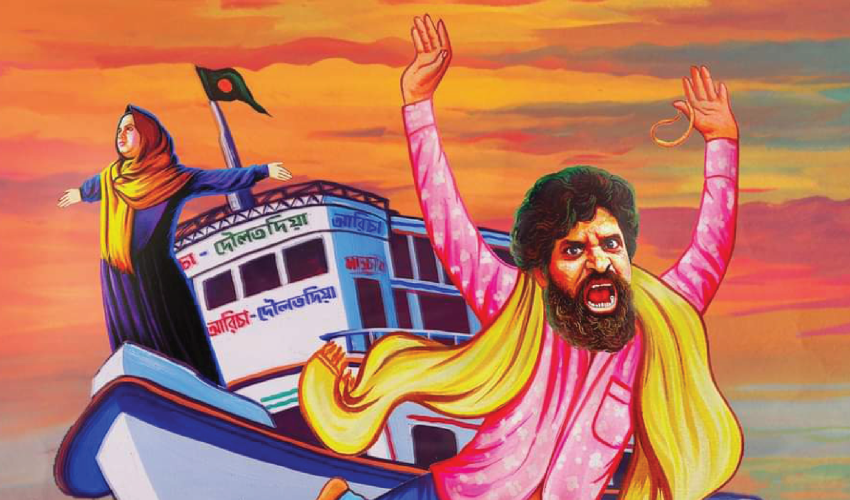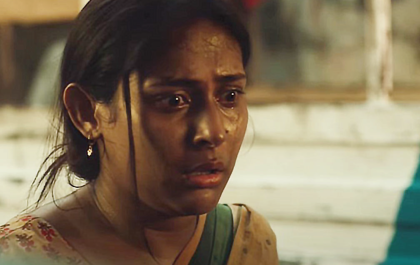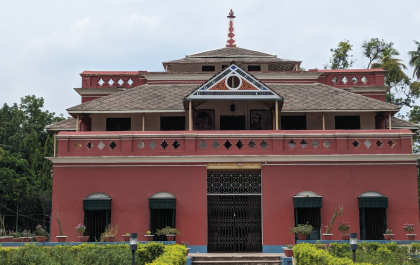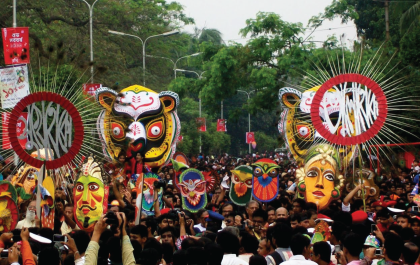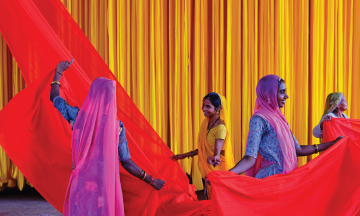A review of Sinpaat
By Ayman Anika
Watching Sinpaat (2024), Mohammad Touqir Islam’s series on Chorki, felt like peeking into a hidden pocket of Bangladesh, where life unfolds amid unforgiving hardships and fleeting moments of hope. Islam, whose work already left a mark with Shaaticup (2022), takes his signature realism a notch deeper in this crime drama rooted in the cultural fabric of Rajshahi and Pabna.
Setting the scene
Sinpaat follows Sohel played by Sohel Sheikh, who emerges from the shadows of a criminal past in real life. He finds himself cornered in a new town, exiled from his past and desperate to carve out some sort of existence.
Paired up with Fazu (Rifat Bin Sajid), a local with equally questionable scruples, Sohel spirals into the chaotic underworld of small-town Bangladesh – drugs, crime, and confrontations are his everyday reality. The twist? This isn’t some glamorized action sequence you’d expect in mainstream cinema – it’s raw and relentless, and the realism is captivating. The series is set in Rajshahi and Pabna, locations Islam chose to inject authenticity into every shot. You can almost feel the heat and dust of these small towns, which gives the drama a real sense of place.
And these aren’t just pretty backdrops either! The locations almost feel like characters themselves, contributing to the tension and grit that Sinpaat thrives on. Islam’s decision to stay outside of Dhaka with his story-telling – both physically and thematically – helps Sinpaat stand out in the world of Bangladeshi crime dramas.
Characters with depth (and flaws)
One of Sinpaat’s biggest strengths is its grounded, relatable characters. Sohel isn’t your typical anti-hero – he’s complicated, often despicable, yet still gripping. He represents a desperation that doesn’t aim to win your empathy but simply to survive. In this world, you root for him not because he’s good but because he feels real. His partner in crime, Fazu, plays the perfect foil, and their dynamic adds a fascinating layer to the story.
What I found intriguing was the way Islam avoided big-name actors and instead cast fresh faces, giving the show a documentary-like authenticity. Some of these actors are non-professionals, which can sometimes lead to uneven performances, but here, it mostly adds to the unpolished charm. The raw, unfiltered quality of their acting enhances the realism and lets the story feel like something you’re witnessing, rather than watching. There’s also an appearance from characters connected to Islam’s Shaati cup, which, for fans of his previous work, provides a pleasant continuity within his creative universe.
However, there’s a downside to this choice too. Not every new actor manages to hold up in intense scenes, and occasionally, the amateurish delivery can break the immersion. While I admire Islam’s choice to stick with local talent, the gamble doesn’t always pay o , and there are moments when the scenes drag or lack the punch they’re aiming for.
Gritty story-telling
Sinpaat translates roughly to “desired accidents” or “sins by choice” – a name that summarizes the series’ essence, where the characters seem to wade into disaster willinglyThis philosophical title reflects the heart of the show, exploring themes like fate, survival, and moral ambiguity. Islam’s decision to make the title a local term from Pabna was smart; it not only anchors the story in its setting but invites viewers to reflect on what the term might mean within the story’s context.
For the most part, Sinpaat’s story-telling works beautifully. Islam’s use of authentic, real-world locations and raw characters pays o in creating an atmosphere that feels thick with tension and unpredictability.
The story is built on Sohel’s relentless pursuit of self-interest, occasionally softened by moments with Duru (Zinnat Ara), a woman who stirs something like affection within him. Their relationship is fragile, filled with unspoken emotions, and introduces a glimmer of vulnerability to Sohel’s hardened persona.
But while Sinpaat excels in atmosphere and setting, the pacing could use some tightening. At seven episodes, the series does a bit of meandering, with some scenes feeling repetitive and stretching the narrative more than necessary. A tighter, six-episode structure might have given it a stronger, more urgent rhythm. Viewers looking for a straightforward thriller might find the series a bit indulgent at times, with Islam leaning heavily on visual story-telling over fast-paced action or suspense.
For me, Sinpaat was a journey worth taking. It’s not a perfect series, and its flaws – occasional uneven acting, slow pacing – are noticeable. Yet, its ambition and authenticity shine through, making it one of the more unique offerings in Bangladeshi crime dramas. It has moments of brilliance, where the story-telling, visuals, and character work come together to create something memorable. And while it’s not a thriller in the traditional sense, Sinpaat is suspenseful in its quiet moments, revealing the psychological depths of its characters as they navigate a world marked by “desired accidents.”
If you’re a fan of indie story-telling, authentic cultural portrayals, and are willing to be patient with its slow-burn pacing, Sinpaat is worth the watch. It’s a rare window into a world we don’t often see on screen, told with heart, grit, and a touch of poetic realism.




